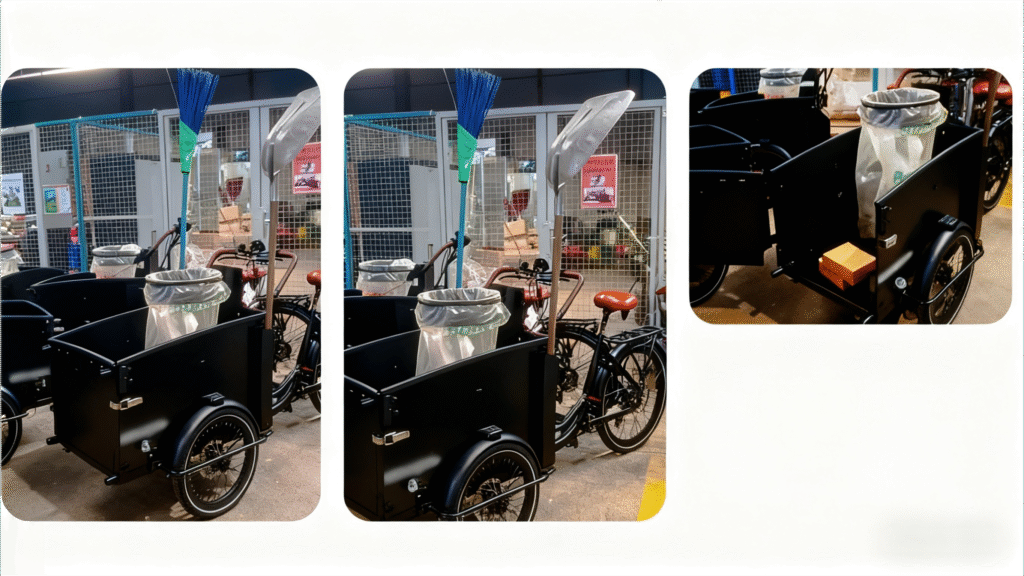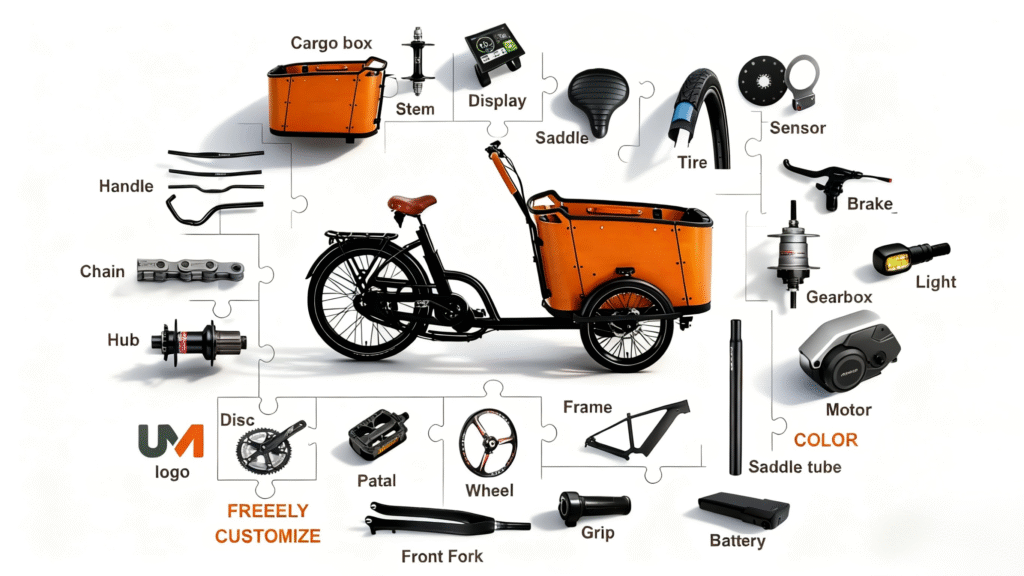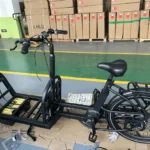The Future of Cargo E-Bikes for Business: A Shift in Industry Dynamics
The cargo e-bike for business sector is undergoing one of its most significant shifts in decades. Once dominated by a straightforward formula—global brand production paired with local dealership distribution—the balance of power is being disrupted.
For many years, the model seemed stable: brands manufactured, dealers sold, and businesses or municipalities purchased through trusted intermediaries. But the rise of direct-to-consumer (D2C) models, aggressive discounting strategies, and supply chain shocks have all destabilised this system.
Today, the question is not who can produce the most bikes, but who can provide sustainable value to B2B customers. The reality is that fleets, delivery companies, retailers, and even city governments need reliability, service, and differentiation—not just more units at lower cost.
The cargo e-bike market is no longer a race to the bottom. It is a test of resilience and adaptability.
Learn more about Safety, Design & Market Trends of Cargobike.
The Current Challenges in the Cargo E-Bike Market
To understand where the industry is heading, it’s worth looking at the immediate pressures faced by businesses and distributors in the sector.
Margin Pressure
Retailers and distributors often find themselves caught between large brands pushing for higher volumes and a customer base demanding competitive pricing. The result is shrinking profit margins. Aggressive seasonal discounting may help clear stock, but it also erodes long-term value and customer trust.
Overproduction and Stock Dumping
A widespread issue in the mobility industry is overproduction. Brands that chase aggressive sales targets often end up with surplus stock, leading to stock dumping at heavily reduced prices. This undermines both dealer relationships and the perceived value of the product. For businesses that invested early at higher prices, the impact can be financially damaging and strategically destabilising.
Brand–Dealer Imbalance
As larger brands centralise pricing strategies and tighten control, dealers are losing influence in their local markets. Their role shifts from trusted advisers to transactional intermediaries, leaving them with little ability to differentiate themselves or add meaningful value.
For B2B cargo bike clients—whether corporate fleets, logistics providers, or small retailers—the risks are clear: unstable pricing, inconsistent supply, and a lack of tailored solutions.
Potential Risks of Cargobike that Enterprises Must Understand.
What Businesses Really Need from Cargo E-Bike Suppliers
Rather than more of the same, businesses are calling for a different kind of partnership from suppliers. Four themes consistently emerge:
1. Reliability and Consistency
Businesses cannot build sustainable operations on unstable ground. What they need most is pricing stability, consistent supply chains, and predictable lead times. A fleet operator managing 100+ bikes cannot afford unexpected delays or cost swings that disrupt operations.
2. Customisation Capability
The ability to offer a custom branded electric cargo bike is more than a marketing gimmick—it’s a tool for differentiation. Delivery companies want their fleets to reflect their brand identity. Retailers want options that suit local market preferences. Customisation creates a premium positioning that price wars cannot erode.
3. ODM and OEM Partnership
Beyond selling bikes, businesses are seeking suppliers willing to co-develop long-term solutions. An ODM cargo bike supplier with custom branding can help partners innovate new models, adapt to local regulations, and share technical expertise. This approach turns the supplier from a vendor into a collaborator.
4. After-Sales and Service
No fleet can operate efficiently without reliable service. Spare parts, maintenance protocols, and technical training all form part of the value chain. For many B2B buyers, a robust after-sales structure is as important as the product itself.
Why Customisation Is the Sustainable Alternative
While some brands continue to compete on price, forward-looking companies are exploring smart customisation as the real path to resilience. Instead of trying to sell generic models into crowded markets, they focus on tailoring bikes to specific business use cases.
Examples of Sustainable Customisation:
- Branded delivery fleets: Last-mile delivery companies can operate with custom branded electric cargo bikes that align visually with their identity, strengthening customer recognition and brand equity.
- Segment-specific models: Families may prioritise safety and comfort features, while logistics firms require reinforced frames and higher load capacities. Both needs can be met by suppliers who offer modular design flexibility.
- ODM with growth potential: Working with an ODM cargo bike supplier with custom branding allows businesses to scale while retaining a unique identity in their market.
Take a real-life example
UM Starter Cargo Bike is not just for family use and deliveries — it’s making urban environments cleaner and greener. In this case, the bike was customized for a local city cleaning team, equipped with tools and waste bins, offering a cost-effective and eco-friendly solution for daily operations.

Close-up of the customized cleaning cargo bike setup. This city cleaning cargo bike was developed together with our customer, helping to keep streets clean and green.
This approach helps partners escape the trap of price-based competition. By embedding brand value into the bike itself, companies protect margins and build stronger customer loyalty.
Data-Driven Engineering: How United Mobility Positions Itself Differently
In such a fragmented and volatile market, technical expertise and long-term reliability become decisive. United Mobility, with over 16 years of R&D and engineering experience, has focused on data-driven product development rather than volume-driven production.
What This Means in Practice:
- Testing and Certification: Every model undergoes rigorous EN certification testing to ensure compliance with European safety and quality standards.
- Design Flexibility: Rather than pushing standardised frames, United Mobility offers modular designs that adapt to both family-oriented and commercial logistics needs.
- Private Label Excellence: Acting as a private label e bike high quality partner, the company supports businesses in building trust with their end-users by ensuring the product matches their market positioning.
This model positions United Mobility not just as a manufacturer, but as a solutions provider—a partner helping businesses address challenges beyond the product itself.
The Road Ahead – Building a Sustainable Cargo E-Bike Ecosystem
The future of the cargo e-bike market will not be defined by how many units can be produced, but by how intelligently the industry can evolve. Several trends are already shaping the road ahead:
- Smart Electrification and IoT: Integration of tracking, predictive maintenance, and fleet management tools will become essential for logistics operators.
- Safety and Durability: Stronger frames and braking systems will support heavier logistics use while improving rider confidence.
- From Volume Growth to Value Growth: Instead of chasing raw sales numbers, the market is moving toward long-term value creation, with businesses looking for lasting partnerships.
United Mobility believes the next phase of growth will come from collaborative ecosystems, where suppliers, dealers, and businesses align around long-term value rather than short-term volume. At the heart of this shift is a simple principle: always start with the end-user experience.

Conclusion – Why Work with a Partner, Not Just a Supplier
The cargo e-bike sector faces undeniable challenges. Price wars, overproduction, and imbalanced supply chains have left many businesses exposed to risks. The alternative, however, is clear: collaborative, customised, and service-oriented partnerships.
United Mobility positions itself as more than a vendor. By acting as an ODM cargo bike supplier with custom branding, the company helps partners escape the cycle of overproduction and short-term gains. Its role is to enable long-term growth through custom electric bike design, engineering, and reliable service.
In a market where short-term sales may look tempting but erode stability, the real winners will be those who build sustainable partnerships. For businesses considering their next move in this evolving sector, the key is simple: choose a partner, not just a supplier.
👉 Explore our ODM solutions






